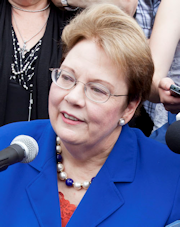by James A. Bacon
Teresa Sullivan has spoken at last, making a statement to the Board of Visitors defending her record as president of the University of Virginia and her philosophy of incremental change. “Corporate-style, top-down leadership does not work in a great university,” she said. “Sustained change with buy-in does work.”
Being an incrementalist, she says, does not mean she lacks a vision, she said, breaking her self-imposed silence since her resignation. She outlined her vision clearly in what she characterized as a “strategic vision statement.” Some of the ideas in that very conceptual document seem promising, especially those that would make the university more competitive in attracting and retaining faculty standouts. But there is much that her vision does not address, and her statement yesterday did nothing to address those concerns. (See my critique of her “Academic Strategy” memo here.)
While it’s clear that a university cannot be run like a corporation — they are prestige-maximizing institutions, not profit-maximizing institutions — universities are, like corporations, constrained by finite resources. It is not unreasonable, given the way tuition and fees have outpaced inflation year after year, decade after decade, to ask a university president to pay close attention to costs, efficiency and productivity.
In the higher education sector as a whole, administration costs have ballooned far faster than other expenses. Sullivan obliquely acknowledged this reality by focusing cuts, such as they are, in non-academic areas. “Strategic cutting and large-scale cost savings have … been concentrated in non-academic areas, and these areas have become notably leaner and more efficient,” she said yesterday.
The emphasis on non-academic cuts is entirely appropriate. I would very much like to know, however, what she cut and how significant the savings are. She provided no details in her statement. This issue is fundamental, and without more information no informed judgment of Sullivan’s tenure can be made.
Sullivan also defended the academic status quo against corporate-style restructuring:
If we were to embark on a course of deep top-down cuts, there would also be difficult questions regarding what to cut. A university that does not teach the full range of arts and sciences will no longer be a university. Certainly it will no longer be respected as such by its former peers. …
Nor can we always predict which kind of knowledge will be of greatest import in the future. Before September 11, few of us understood just how important Arabic and other Middle Eastern and Central Asian languages would become — to our students, to the nation, and to national security. Suppose we had eliminated some of those languages because of low enrollment or other fiscal considerations before 2001. We would be scrambling to recreate them now.
There is some truth in what she says. But by her logic, a university shouldn’t retrench in any field of knowledge. Yet the University of Virginia cannot be all things to all people. It cannot achieve excellence in all areas. Some of the areas where it excels today, as Sullivan herself has acknowledged, may not be the areas where it wants to excel in the future. Someone has to make hard choices. But Sullivan, in essence, was saying that she refuses to.
Finally, while it’s clear that Sullivan is open to technologies that facilitate online education — she cited the creation of the 4VA telepresence consortium with the state, Cisco, Virginia Tech, George Mason, and James Madison to share courses and other resources — she still did not address the larger issue. How should UVa should position itself in a world in which an increasing amount of education will take place online, people can easily acquire specific skill sets they need for the marketplace, and there will be a decreasing demand for the credential of an expensive, four-year degree?
Here’s what the conflict boils down to: Some people understand that higher education is in a profound crisis — runaway costs, excessive tuition and fees, and burgeoning online competition — and believe that dramatic action is needed, while others don’t. The Sullivan-resignation controversy is arguably the most important conflict taking place in higher education today. I hope the Board of Visitors hangs tough.



